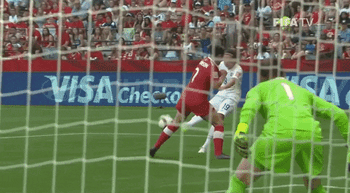Juneteenth & sports
❓ What is Juneteenth?
Juneteenth celebrates June 19th, 1865 — the date that federal troops arrived in Galveston, Texas to announce that all enslaved people were officially free under the Emancipation Proclamation, which had been signed by U.S. President Abraham Lincoln more than two years earlier.
- The holiday has long been celebrated in the Black community, with public readings of the Emancipation Proclamation, music, cookouts and more.
Though many have advocated for Juneteenth to become a federal holiday since the mid-1990s, it officially earned that status in June 2021. Legislation breezed through both chambers of Congress, and President Joe Biden signed off on it two days before the holiday.
- The push to make Juneteenth a federal holiday gained steam following a global reckoning on racism in 2020. That May, the murder of George Floyd by Minneapolis police officers inspired Black Lives Matter (BLM) protests around the world.
- And those efforts extended into sports — players kneeled, marched, and led the way through a summer that forever changed the world.
💪 Women’s sports taking charge
Stop us if you heard this one before, but, as they’ve been so many times before, the WNBA was at the forefront of change and activism throughout 2020.
- When the W returned to play inside the Bradenton, Florida–based “Wubble,” the league came together to dedicate the season to Breonna Taylor, the 26-year-old Black woman who was killed by police inside her own home in March 2020.
- Players observed a 26-second moment of silence prior to the first game’s tip-off, wore Taylor’s name across their backs all season long and continually uplifted the #SayHerName campaign, highlighting the Black women lost to police violence.
- At a time when so many felt hopeless and directionless, the W steered the ship, competing through a global pandemic while bringing attention to causes bigger than ball. The WNBA is so important.
Before the W returned to action in July, the NWSL was the first U.S. pro league to resume play following pandemic-induced shutdowns, returning with the NWSL Challenge Cup in June 2020.
- The NWSL�’s show of solidarity was led by the players, who worked with the league to arrange warmup t-shirts and in-stadium banners supporting the BLM movement. Many players also opted to kneel during the national anthem, mirroring Colin Kaepernick.
✊ The rise in athlete activism
Despite what some might think, athletes have been using theirplatforms to inspire change for generations — a trend that rapidly blossomed during the summer of 2020. Players and coaches took to the streets in the wake of George Floyd’s murder, organizing and advocating for change.
- Some immediate improvements? The USWNT (specifically their players of color and LGBTQIA+ athletes) led the fight in advocating for the U.S. Soccer Federation to rescind its ban on players kneeling for the national anthem.
- And in college sports, Georgia Tech assistant basketball coach Eric Reveno started a movement to mandate Election Day as an off-day for Division 1 NCAA student-athletes, a goal that was realized soon after. Nailed it.
🚫 The wildcat strikes
The groundswell of momentum culminated later that year on August 26th when athletes in the NBA, WNBA, MLB and MLS conducted wildcat strikes following the police shooting of Jacob Blake in Kenosha, Wisconsin.
- It all began with the Milwaukee Bucks, who are based around 40 miles from Kenosha. The Bucks were set for a first-round playoff game vs. the Orlando Magic that day, but they boycotted the contest, inspiring athletes in other leagues to do the same.
- The NBA ultimately postponed all games for the day, but not before then–LA Clippers and current Philadelphia 76ers coach Doc Rivers gave an incredibly powerful and poignant speech.
- Players in the WNBA, MLB and MLS followed suit, boycotting or calling for the postponement of games. In tennis, Naomi Osaka announced that she would not play her semifinal at the Cincinnati Masters in protest.
The unprecedented strike lasted only a few days, but the impact was indelible. NBA players returned to action after the league met their demands, which included the formation of a social justice coalition plus improved voting opportunities in team markets.
- Other athletes followed suit, calling for systemic changes in their leagues…some of which still need to be addressed.
- The movement also underscored just how influential and effective athletes can be. Players rallied together, harnessed their collective voices and platforms and galvanized real, tangible action. Truly unforgettable.
🎉 How to celebrate and support
Now that Juneteenth is finally a federal holiday, it’s time to properly celebrate and support. Several U.S. sports leagues now boast organizations advocating for and uplifting Black athletes. MLS’ Black Players for Change launched on Juneteenth in 2020, and the NWSL’s Black Women’s Player Collective (BWPC) formed in October of the same year.
- They’re preceded by organizations like the Black Student-Athlete Alliance (BSAA), which has had a presence on many U.S. college and university campuses for years, providing a community of comfort and support for collegiate athletes.
These groups are leading the way in commemorating Juneteenth across sports. The BWPC will sell its first clothing collection at today’s NJ/NY Gotham FC game, with 100% of sales going back to the nonprofit.
- MLS teams will wear “Freedom to Be” jersey numbers this weekend and will auction off the game-worn gear to organizations supporting Black communities. Cause for celebration.
Enjoying this article? Want more?

Sign up for The GIST and receive the latest sports news straight to your inbox three times a week.

